R v. R: Marital Rape Judgement
VerifiedAdded on 2020/02/03
|8
|2872
|58
Report
AI Summary
This report provides a comprehensive analysis of the landmark legal case R v. R [1991] UKHL 12, which addressed the issue of marital rape under English common law. The report details the arguments presented, the court's decision to overturn the marital rape exemption, and the impact of this ruling on subsequent legal developments. It examines the evolution of legal thinking surrounding marital consent and the implications of the decision for the status of women in society. The report also discusses criticisms of the retrospective application of the ruling and its eventual reconciliation with human rights principles. The conclusion emphasizes the significance of R v. R in reforming the legal landscape concerning sexual offenses within marriage.
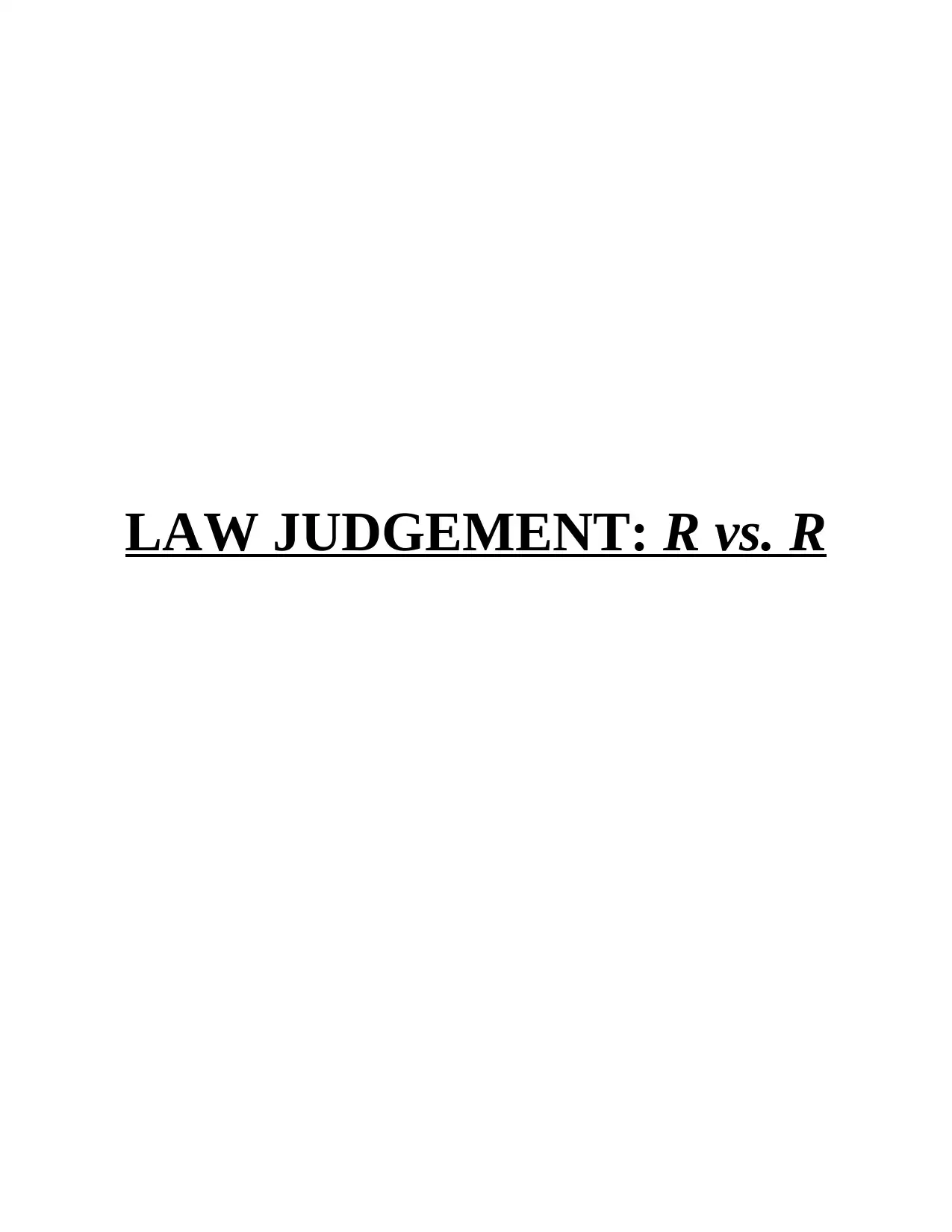
LAW JUDGEMENT: R vs. R
Paraphrase This Document
Need a fresh take? Get an instant paraphrase of this document with our AI Paraphraser
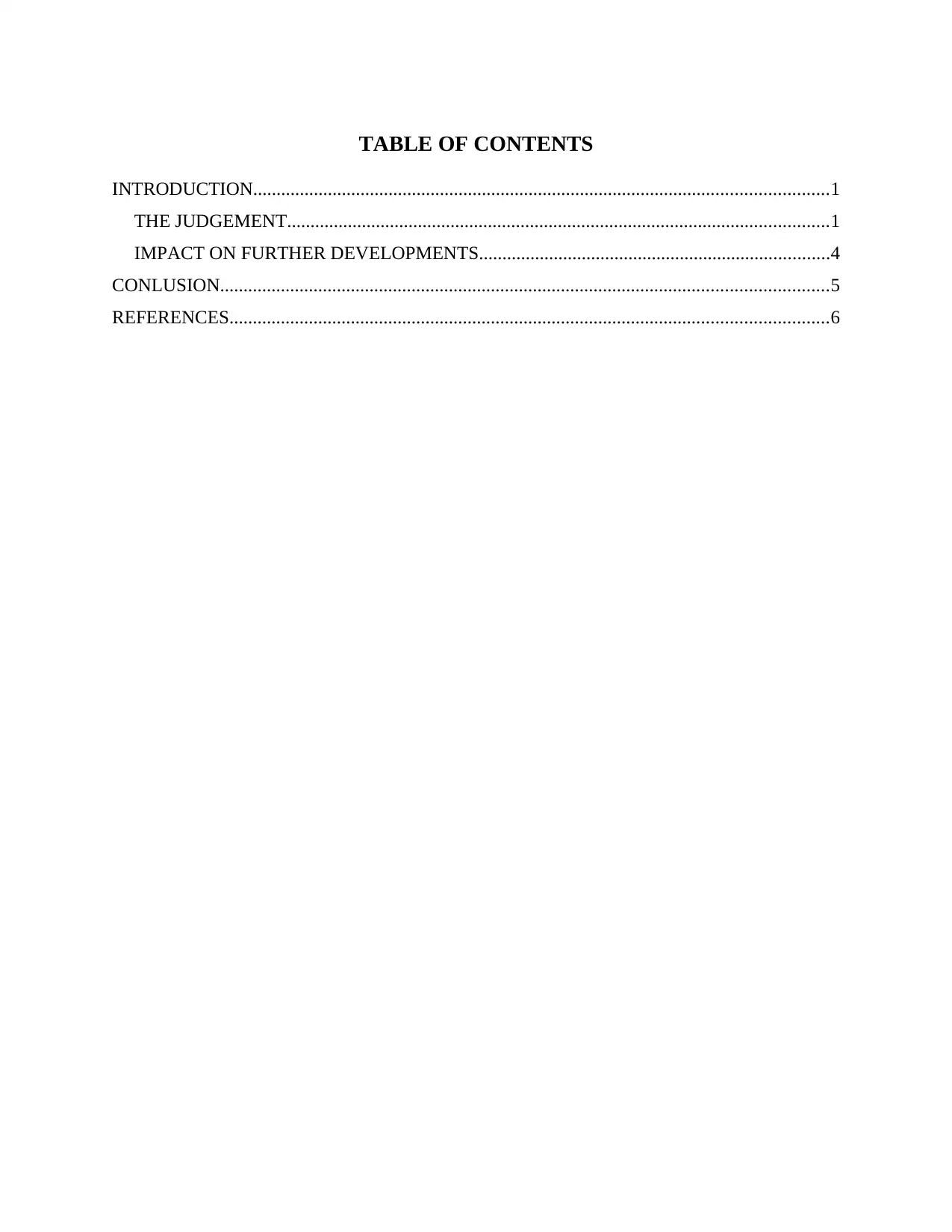
TABLE OF CONTENTS
INTRODUCTION...........................................................................................................................1
THE JUDGEMENT....................................................................................................................1
IMPACT ON FURTHER DEVELOPMENTS...........................................................................4
CONLUSION..................................................................................................................................5
REFERENCES................................................................................................................................6
INTRODUCTION...........................................................................................................................1
THE JUDGEMENT....................................................................................................................1
IMPACT ON FURTHER DEVELOPMENTS...........................................................................4
CONLUSION..................................................................................................................................5
REFERENCES................................................................................................................................6
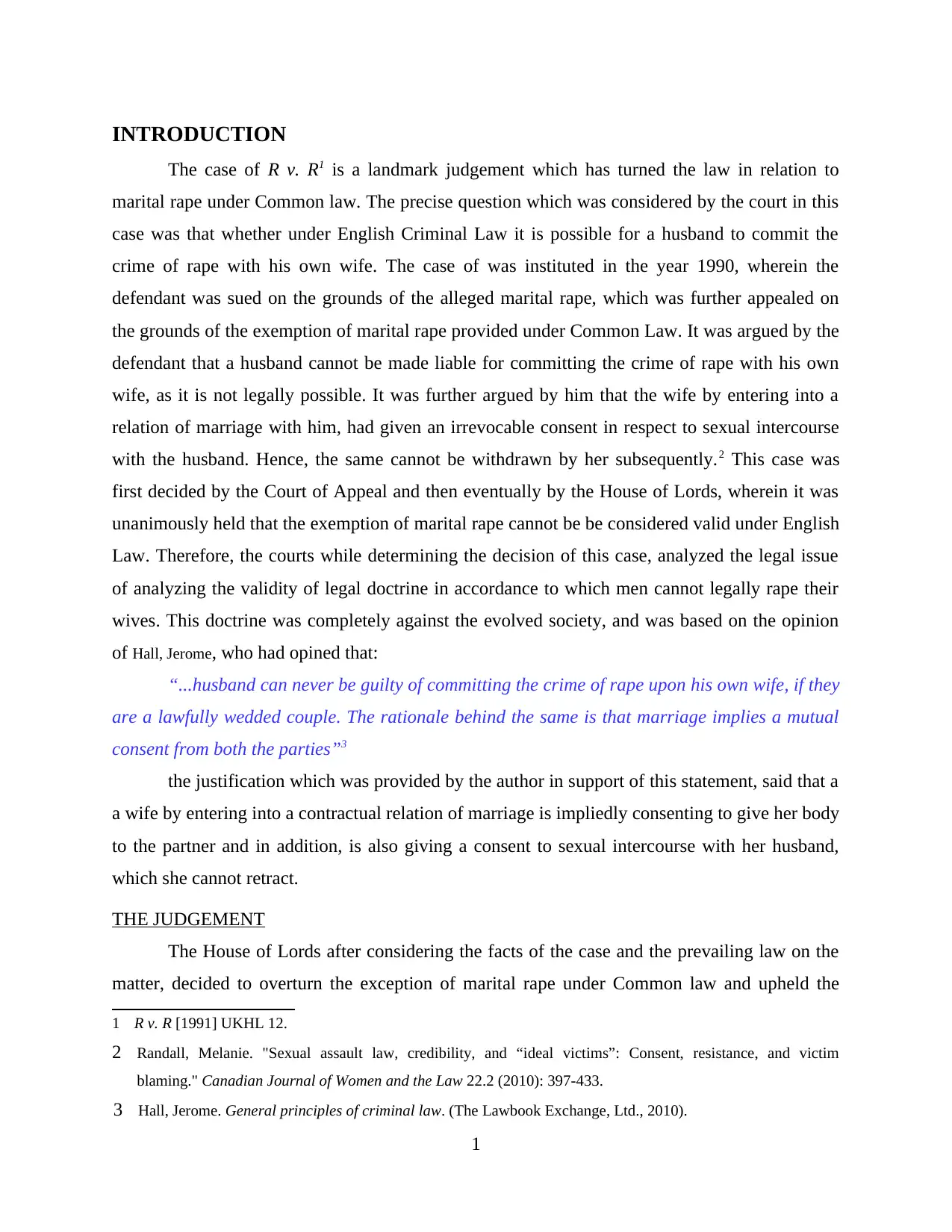
INTRODUCTION
The case of R v. R1 is a landmark judgement which has turned the law in relation to
marital rape under Common law. The precise question which was considered by the court in this
case was that whether under English Criminal Law it is possible for a husband to commit the
crime of rape with his own wife. The case of was instituted in the year 1990, wherein the
defendant was sued on the grounds of the alleged marital rape, which was further appealed on
the grounds of the exemption of marital rape provided under Common Law. It was argued by the
defendant that a husband cannot be made liable for committing the crime of rape with his own
wife, as it is not legally possible. It was further argued by him that the wife by entering into a
relation of marriage with him, had given an irrevocable consent in respect to sexual intercourse
with the husband. Hence, the same cannot be withdrawn by her subsequently.2 This case was
first decided by the Court of Appeal and then eventually by the House of Lords, wherein it was
unanimously held that the exemption of marital rape cannot be be considered valid under English
Law. Therefore, the courts while determining the decision of this case, analyzed the legal issue
of analyzing the validity of legal doctrine in accordance to which men cannot legally rape their
wives. This doctrine was completely against the evolved society, and was based on the opinion
of Hall, Jerome, who had opined that:
“...husband can never be guilty of committing the crime of rape upon his own wife, if they
are a lawfully wedded couple. The rationale behind the same is that marriage implies a mutual
consent from both the parties”3
the justification which was provided by the author in support of this statement, said that a
a wife by entering into a contractual relation of marriage is impliedly consenting to give her body
to the partner and in addition, is also giving a consent to sexual intercourse with her husband,
which she cannot retract.
THE JUDGEMENT
The House of Lords after considering the facts of the case and the prevailing law on the
matter, decided to overturn the exception of marital rape under Common law and upheld the
1 R v. R [1991] UKHL 12.
2 Randall, Melanie. "Sexual assault law, credibility, and “ideal victims”: Consent, resistance, and victim
blaming." Canadian Journal of Women and the Law 22.2 (2010): 397-433.
3 Hall, Jerome. General principles of criminal law. (The Lawbook Exchange, Ltd., 2010).
1
The case of R v. R1 is a landmark judgement which has turned the law in relation to
marital rape under Common law. The precise question which was considered by the court in this
case was that whether under English Criminal Law it is possible for a husband to commit the
crime of rape with his own wife. The case of was instituted in the year 1990, wherein the
defendant was sued on the grounds of the alleged marital rape, which was further appealed on
the grounds of the exemption of marital rape provided under Common Law. It was argued by the
defendant that a husband cannot be made liable for committing the crime of rape with his own
wife, as it is not legally possible. It was further argued by him that the wife by entering into a
relation of marriage with him, had given an irrevocable consent in respect to sexual intercourse
with the husband. Hence, the same cannot be withdrawn by her subsequently.2 This case was
first decided by the Court of Appeal and then eventually by the House of Lords, wherein it was
unanimously held that the exemption of marital rape cannot be be considered valid under English
Law. Therefore, the courts while determining the decision of this case, analyzed the legal issue
of analyzing the validity of legal doctrine in accordance to which men cannot legally rape their
wives. This doctrine was completely against the evolved society, and was based on the opinion
of Hall, Jerome, who had opined that:
“...husband can never be guilty of committing the crime of rape upon his own wife, if they
are a lawfully wedded couple. The rationale behind the same is that marriage implies a mutual
consent from both the parties”3
the justification which was provided by the author in support of this statement, said that a
a wife by entering into a contractual relation of marriage is impliedly consenting to give her body
to the partner and in addition, is also giving a consent to sexual intercourse with her husband,
which she cannot retract.
THE JUDGEMENT
The House of Lords after considering the facts of the case and the prevailing law on the
matter, decided to overturn the exception of marital rape under Common law and upheld the
1 R v. R [1991] UKHL 12.
2 Randall, Melanie. "Sexual assault law, credibility, and “ideal victims”: Consent, resistance, and victim
blaming." Canadian Journal of Women and the Law 22.2 (2010): 397-433.
3 Hall, Jerome. General principles of criminal law. (The Lawbook Exchange, Ltd., 2010).
1
⊘ This is a preview!⊘
Do you want full access?
Subscribe today to unlock all pages.

Trusted by 1+ million students worldwide
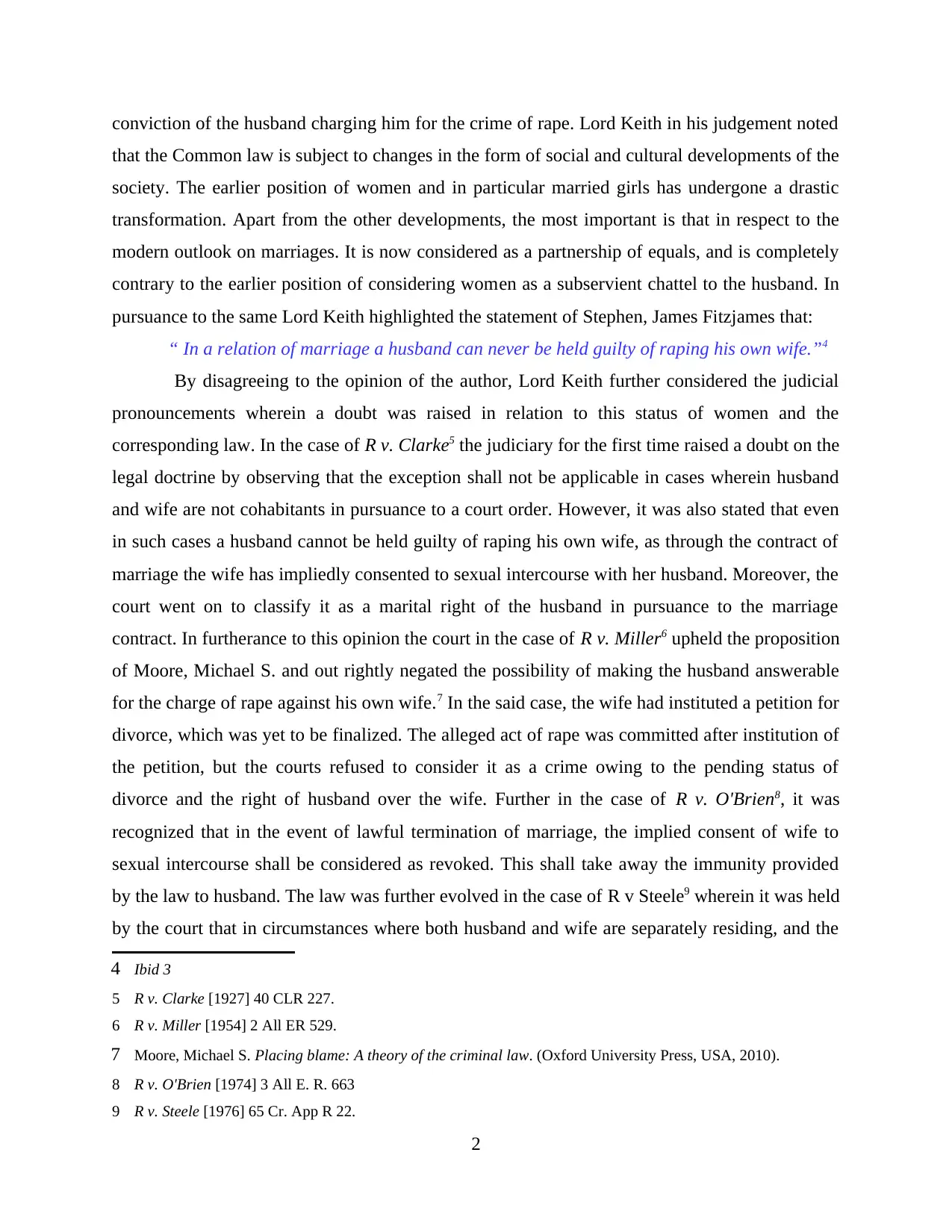
conviction of the husband charging him for the crime of rape. Lord Keith in his judgement noted
that the Common law is subject to changes in the form of social and cultural developments of the
society. The earlier position of women and in particular married girls has undergone a drastic
transformation. Apart from the other developments, the most important is that in respect to the
modern outlook on marriages. It is now considered as a partnership of equals, and is completely
contrary to the earlier position of considering women as a subservient chattel to the husband. In
pursuance to the same Lord Keith highlighted the statement of Stephen, James Fitzjames that:
“ In a relation of marriage a husband can never be held guilty of raping his own wife.”4
By disagreeing to the opinion of the author, Lord Keith further considered the judicial
pronouncements wherein a doubt was raised in relation to this status of women and the
corresponding law. In the case of R v. Clarke5 the judiciary for the first time raised a doubt on the
legal doctrine by observing that the exception shall not be applicable in cases wherein husband
and wife are not cohabitants in pursuance to a court order. However, it was also stated that even
in such cases a husband cannot be held guilty of raping his own wife, as through the contract of
marriage the wife has impliedly consented to sexual intercourse with her husband. Moreover, the
court went on to classify it as a marital right of the husband in pursuance to the marriage
contract. In furtherance to this opinion the court in the case of R v. Miller6 upheld the proposition
of Moore, Michael S. and out rightly negated the possibility of making the husband answerable
for the charge of rape against his own wife.7 In the said case, the wife had instituted a petition for
divorce, which was yet to be finalized. The alleged act of rape was committed after institution of
the petition, but the courts refused to consider it as a crime owing to the pending status of
divorce and the right of husband over the wife. Further in the case of R v. O'Brien8, it was
recognized that in the event of lawful termination of marriage, the implied consent of wife to
sexual intercourse shall be considered as revoked. This shall take away the immunity provided
by the law to husband. The law was further evolved in the case of R v Steele9 wherein it was held
by the court that in circumstances where both husband and wife are separately residing, and the
4 Ibid 3
5 R v. Clarke [1927] 40 CLR 227.
6 R v. Miller [1954] 2 All ER 529.
7 Moore, Michael S. Placing blame: A theory of the criminal law. (Oxford University Press, USA, 2010).
8 R v. O'Brien [1974] 3 All E. R. 663
9 R v. Steele [1976] 65 Cr. App R 22.
2
that the Common law is subject to changes in the form of social and cultural developments of the
society. The earlier position of women and in particular married girls has undergone a drastic
transformation. Apart from the other developments, the most important is that in respect to the
modern outlook on marriages. It is now considered as a partnership of equals, and is completely
contrary to the earlier position of considering women as a subservient chattel to the husband. In
pursuance to the same Lord Keith highlighted the statement of Stephen, James Fitzjames that:
“ In a relation of marriage a husband can never be held guilty of raping his own wife.”4
By disagreeing to the opinion of the author, Lord Keith further considered the judicial
pronouncements wherein a doubt was raised in relation to this status of women and the
corresponding law. In the case of R v. Clarke5 the judiciary for the first time raised a doubt on the
legal doctrine by observing that the exception shall not be applicable in cases wherein husband
and wife are not cohabitants in pursuance to a court order. However, it was also stated that even
in such cases a husband cannot be held guilty of raping his own wife, as through the contract of
marriage the wife has impliedly consented to sexual intercourse with her husband. Moreover, the
court went on to classify it as a marital right of the husband in pursuance to the marriage
contract. In furtherance to this opinion the court in the case of R v. Miller6 upheld the proposition
of Moore, Michael S. and out rightly negated the possibility of making the husband answerable
for the charge of rape against his own wife.7 In the said case, the wife had instituted a petition for
divorce, which was yet to be finalized. The alleged act of rape was committed after institution of
the petition, but the courts refused to consider it as a crime owing to the pending status of
divorce and the right of husband over the wife. Further in the case of R v. O'Brien8, it was
recognized that in the event of lawful termination of marriage, the implied consent of wife to
sexual intercourse shall be considered as revoked. This shall take away the immunity provided
by the law to husband. The law was further evolved in the case of R v Steele9 wherein it was held
by the court that in circumstances where both husband and wife are separately residing, and the
4 Ibid 3
5 R v. Clarke [1927] 40 CLR 227.
6 R v. Miller [1954] 2 All ER 529.
7 Moore, Michael S. Placing blame: A theory of the criminal law. (Oxford University Press, USA, 2010).
8 R v. O'Brien [1974] 3 All E. R. 663
9 R v. Steele [1976] 65 Cr. App R 22.
2
Paraphrase This Document
Need a fresh take? Get an instant paraphrase of this document with our AI Paraphraser
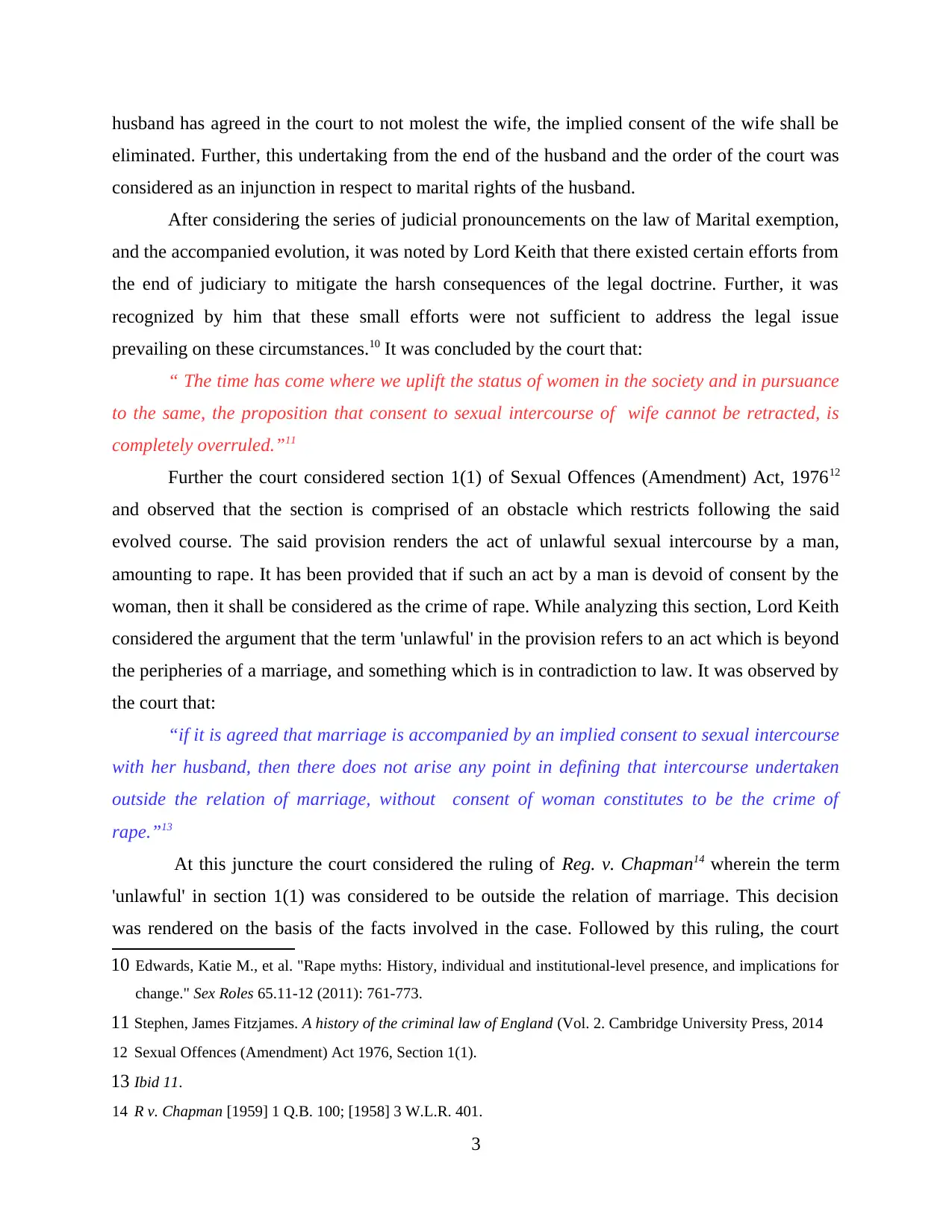
husband has agreed in the court to not molest the wife, the implied consent of the wife shall be
eliminated. Further, this undertaking from the end of the husband and the order of the court was
considered as an injunction in respect to marital rights of the husband.
After considering the series of judicial pronouncements on the law of Marital exemption,
and the accompanied evolution, it was noted by Lord Keith that there existed certain efforts from
the end of judiciary to mitigate the harsh consequences of the legal doctrine. Further, it was
recognized by him that these small efforts were not sufficient to address the legal issue
prevailing on these circumstances.10 It was concluded by the court that:
“ The time has come where we uplift the status of women in the society and in pursuance
to the same, the proposition that consent to sexual intercourse of wife cannot be retracted, is
completely overruled.”11
Further the court considered section 1(1) of Sexual Offences (Amendment) Act, 197612
and observed that the section is comprised of an obstacle which restricts following the said
evolved course. The said provision renders the act of unlawful sexual intercourse by a man,
amounting to rape. It has been provided that if such an act by a man is devoid of consent by the
woman, then it shall be considered as the crime of rape. While analyzing this section, Lord Keith
considered the argument that the term 'unlawful' in the provision refers to an act which is beyond
the peripheries of a marriage, and something which is in contradiction to law. It was observed by
the court that:
“if it is agreed that marriage is accompanied by an implied consent to sexual intercourse
with her husband, then there does not arise any point in defining that intercourse undertaken
outside the relation of marriage, without consent of woman constitutes to be the crime of
rape.”13
At this juncture the court considered the ruling of Reg. v. Chapman14 wherein the term
'unlawful' in section 1(1) was considered to be outside the relation of marriage. This decision
was rendered on the basis of the facts involved in the case. Followed by this ruling, the court
10 Edwards, Katie M., et al. "Rape myths: History, individual and institutional-level presence, and implications for
change." Sex Roles 65.11-12 (2011): 761-773.
11 Stephen, James Fitzjames. A history of the criminal law of England (Vol. 2. Cambridge University Press, 2014
12 Sexual Offences (Amendment) Act 1976, Section 1(1).
13 Ibid 11.
14 R v. Chapman [1959] 1 Q.B. 100; [1958] 3 W.L.R. 401.
3
eliminated. Further, this undertaking from the end of the husband and the order of the court was
considered as an injunction in respect to marital rights of the husband.
After considering the series of judicial pronouncements on the law of Marital exemption,
and the accompanied evolution, it was noted by Lord Keith that there existed certain efforts from
the end of judiciary to mitigate the harsh consequences of the legal doctrine. Further, it was
recognized by him that these small efforts were not sufficient to address the legal issue
prevailing on these circumstances.10 It was concluded by the court that:
“ The time has come where we uplift the status of women in the society and in pursuance
to the same, the proposition that consent to sexual intercourse of wife cannot be retracted, is
completely overruled.”11
Further the court considered section 1(1) of Sexual Offences (Amendment) Act, 197612
and observed that the section is comprised of an obstacle which restricts following the said
evolved course. The said provision renders the act of unlawful sexual intercourse by a man,
amounting to rape. It has been provided that if such an act by a man is devoid of consent by the
woman, then it shall be considered as the crime of rape. While analyzing this section, Lord Keith
considered the argument that the term 'unlawful' in the provision refers to an act which is beyond
the peripheries of a marriage, and something which is in contradiction to law. It was observed by
the court that:
“if it is agreed that marriage is accompanied by an implied consent to sexual intercourse
with her husband, then there does not arise any point in defining that intercourse undertaken
outside the relation of marriage, without consent of woman constitutes to be the crime of
rape.”13
At this juncture the court considered the ruling of Reg. v. Chapman14 wherein the term
'unlawful' in section 1(1) was considered to be outside the relation of marriage. This decision
was rendered on the basis of the facts involved in the case. Followed by this ruling, the court
10 Edwards, Katie M., et al. "Rape myths: History, individual and institutional-level presence, and implications for
change." Sex Roles 65.11-12 (2011): 761-773.
11 Stephen, James Fitzjames. A history of the criminal law of England (Vol. 2. Cambridge University Press, 2014
12 Sexual Offences (Amendment) Act 1976, Section 1(1).
13 Ibid 11.
14 R v. Chapman [1959] 1 Q.B. 100; [1958] 3 W.L.R. 401.
3
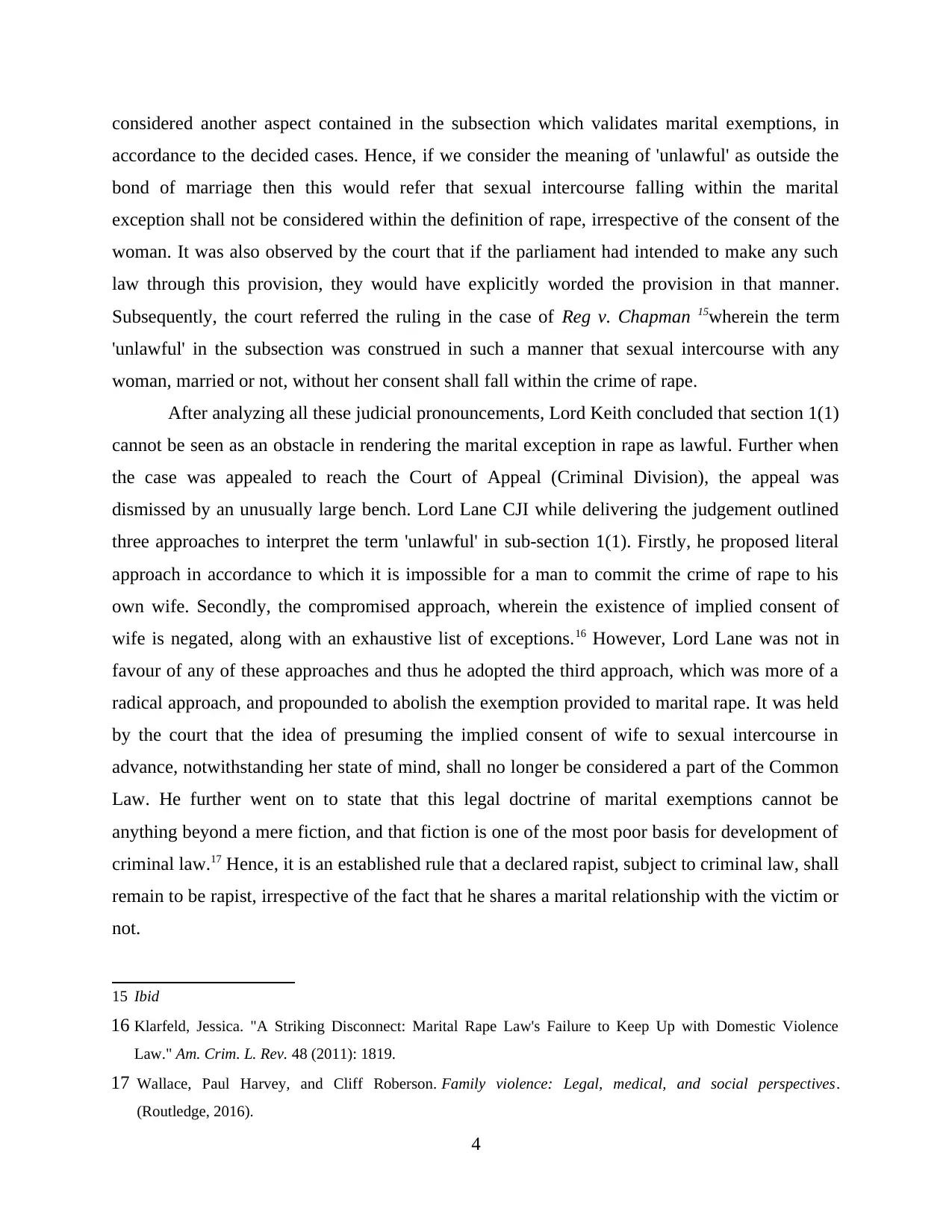
considered another aspect contained in the subsection which validates marital exemptions, in
accordance to the decided cases. Hence, if we consider the meaning of 'unlawful' as outside the
bond of marriage then this would refer that sexual intercourse falling within the marital
exception shall not be considered within the definition of rape, irrespective of the consent of the
woman. It was also observed by the court that if the parliament had intended to make any such
law through this provision, they would have explicitly worded the provision in that manner.
Subsequently, the court referred the ruling in the case of Reg v. Chapman 15wherein the term
'unlawful' in the subsection was construed in such a manner that sexual intercourse with any
woman, married or not, without her consent shall fall within the crime of rape.
After analyzing all these judicial pronouncements, Lord Keith concluded that section 1(1)
cannot be seen as an obstacle in rendering the marital exception in rape as lawful. Further when
the case was appealed to reach the Court of Appeal (Criminal Division), the appeal was
dismissed by an unusually large bench. Lord Lane CJI while delivering the judgement outlined
three approaches to interpret the term 'unlawful' in sub-section 1(1). Firstly, he proposed literal
approach in accordance to which it is impossible for a man to commit the crime of rape to his
own wife. Secondly, the compromised approach, wherein the existence of implied consent of
wife is negated, along with an exhaustive list of exceptions.16 However, Lord Lane was not in
favour of any of these approaches and thus he adopted the third approach, which was more of a
radical approach, and propounded to abolish the exemption provided to marital rape. It was held
by the court that the idea of presuming the implied consent of wife to sexual intercourse in
advance, notwithstanding her state of mind, shall no longer be considered a part of the Common
Law. He further went on to state that this legal doctrine of marital exemptions cannot be
anything beyond a mere fiction, and that fiction is one of the most poor basis for development of
criminal law.17 Hence, it is an established rule that a declared rapist, subject to criminal law, shall
remain to be rapist, irrespective of the fact that he shares a marital relationship with the victim or
not.
15 Ibid
16 Klarfeld, Jessica. "A Striking Disconnect: Marital Rape Law's Failure to Keep Up with Domestic Violence
Law." Am. Crim. L. Rev. 48 (2011): 1819.
17 Wallace, Paul Harvey, and Cliff Roberson. Family violence: Legal, medical, and social perspectives.
(Routledge, 2016).
4
accordance to the decided cases. Hence, if we consider the meaning of 'unlawful' as outside the
bond of marriage then this would refer that sexual intercourse falling within the marital
exception shall not be considered within the definition of rape, irrespective of the consent of the
woman. It was also observed by the court that if the parliament had intended to make any such
law through this provision, they would have explicitly worded the provision in that manner.
Subsequently, the court referred the ruling in the case of Reg v. Chapman 15wherein the term
'unlawful' in the subsection was construed in such a manner that sexual intercourse with any
woman, married or not, without her consent shall fall within the crime of rape.
After analyzing all these judicial pronouncements, Lord Keith concluded that section 1(1)
cannot be seen as an obstacle in rendering the marital exception in rape as lawful. Further when
the case was appealed to reach the Court of Appeal (Criminal Division), the appeal was
dismissed by an unusually large bench. Lord Lane CJI while delivering the judgement outlined
three approaches to interpret the term 'unlawful' in sub-section 1(1). Firstly, he proposed literal
approach in accordance to which it is impossible for a man to commit the crime of rape to his
own wife. Secondly, the compromised approach, wherein the existence of implied consent of
wife is negated, along with an exhaustive list of exceptions.16 However, Lord Lane was not in
favour of any of these approaches and thus he adopted the third approach, which was more of a
radical approach, and propounded to abolish the exemption provided to marital rape. It was held
by the court that the idea of presuming the implied consent of wife to sexual intercourse in
advance, notwithstanding her state of mind, shall no longer be considered a part of the Common
Law. He further went on to state that this legal doctrine of marital exemptions cannot be
anything beyond a mere fiction, and that fiction is one of the most poor basis for development of
criminal law.17 Hence, it is an established rule that a declared rapist, subject to criminal law, shall
remain to be rapist, irrespective of the fact that he shares a marital relationship with the victim or
not.
15 Ibid
16 Klarfeld, Jessica. "A Striking Disconnect: Marital Rape Law's Failure to Keep Up with Domestic Violence
Law." Am. Crim. L. Rev. 48 (2011): 1819.
17 Wallace, Paul Harvey, and Cliff Roberson. Family violence: Legal, medical, and social perspectives.
(Routledge, 2016).
4
⊘ This is a preview!⊘
Do you want full access?
Subscribe today to unlock all pages.

Trusted by 1+ million students worldwide
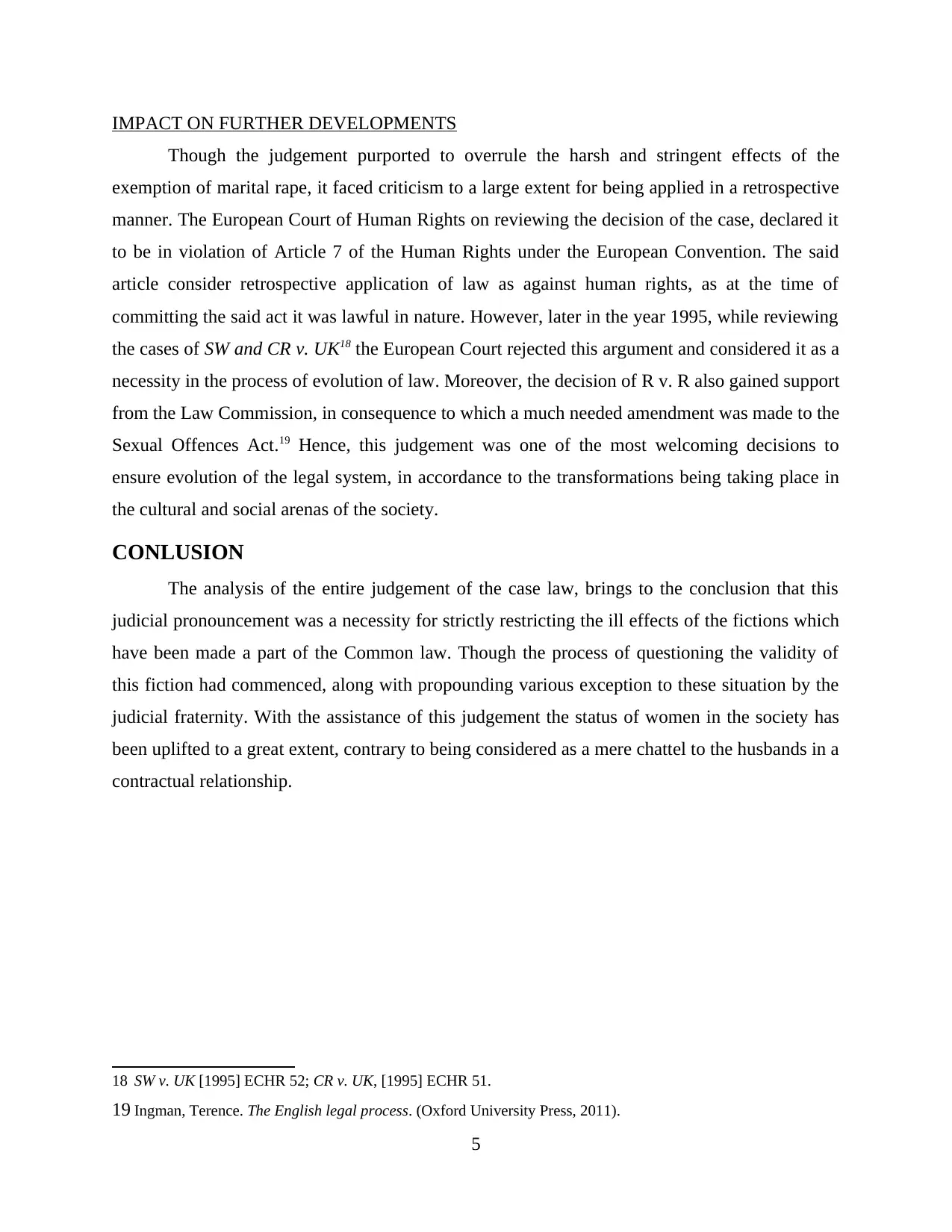
IMPACT ON FURTHER DEVELOPMENTS
Though the judgement purported to overrule the harsh and stringent effects of the
exemption of marital rape, it faced criticism to a large extent for being applied in a retrospective
manner. The European Court of Human Rights on reviewing the decision of the case, declared it
to be in violation of Article 7 of the Human Rights under the European Convention. The said
article consider retrospective application of law as against human rights, as at the time of
committing the said act it was lawful in nature. However, later in the year 1995, while reviewing
the cases of SW and CR v. UK18 the European Court rejected this argument and considered it as a
necessity in the process of evolution of law. Moreover, the decision of R v. R also gained support
from the Law Commission, in consequence to which a much needed amendment was made to the
Sexual Offences Act.19 Hence, this judgement was one of the most welcoming decisions to
ensure evolution of the legal system, in accordance to the transformations being taking place in
the cultural and social arenas of the society.
CONLUSION
The analysis of the entire judgement of the case law, brings to the conclusion that this
judicial pronouncement was a necessity for strictly restricting the ill effects of the fictions which
have been made a part of the Common law. Though the process of questioning the validity of
this fiction had commenced, along with propounding various exception to these situation by the
judicial fraternity. With the assistance of this judgement the status of women in the society has
been uplifted to a great extent, contrary to being considered as a mere chattel to the husbands in a
contractual relationship.
18 SW v. UK [1995] ECHR 52; CR v. UK, [1995] ECHR 51.
19 Ingman, Terence. The English legal process. (Oxford University Press, 2011).
5
Though the judgement purported to overrule the harsh and stringent effects of the
exemption of marital rape, it faced criticism to a large extent for being applied in a retrospective
manner. The European Court of Human Rights on reviewing the decision of the case, declared it
to be in violation of Article 7 of the Human Rights under the European Convention. The said
article consider retrospective application of law as against human rights, as at the time of
committing the said act it was lawful in nature. However, later in the year 1995, while reviewing
the cases of SW and CR v. UK18 the European Court rejected this argument and considered it as a
necessity in the process of evolution of law. Moreover, the decision of R v. R also gained support
from the Law Commission, in consequence to which a much needed amendment was made to the
Sexual Offences Act.19 Hence, this judgement was one of the most welcoming decisions to
ensure evolution of the legal system, in accordance to the transformations being taking place in
the cultural and social arenas of the society.
CONLUSION
The analysis of the entire judgement of the case law, brings to the conclusion that this
judicial pronouncement was a necessity for strictly restricting the ill effects of the fictions which
have been made a part of the Common law. Though the process of questioning the validity of
this fiction had commenced, along with propounding various exception to these situation by the
judicial fraternity. With the assistance of this judgement the status of women in the society has
been uplifted to a great extent, contrary to being considered as a mere chattel to the husbands in a
contractual relationship.
18 SW v. UK [1995] ECHR 52; CR v. UK, [1995] ECHR 51.
19 Ingman, Terence. The English legal process. (Oxford University Press, 2011).
5
Paraphrase This Document
Need a fresh take? Get an instant paraphrase of this document with our AI Paraphraser
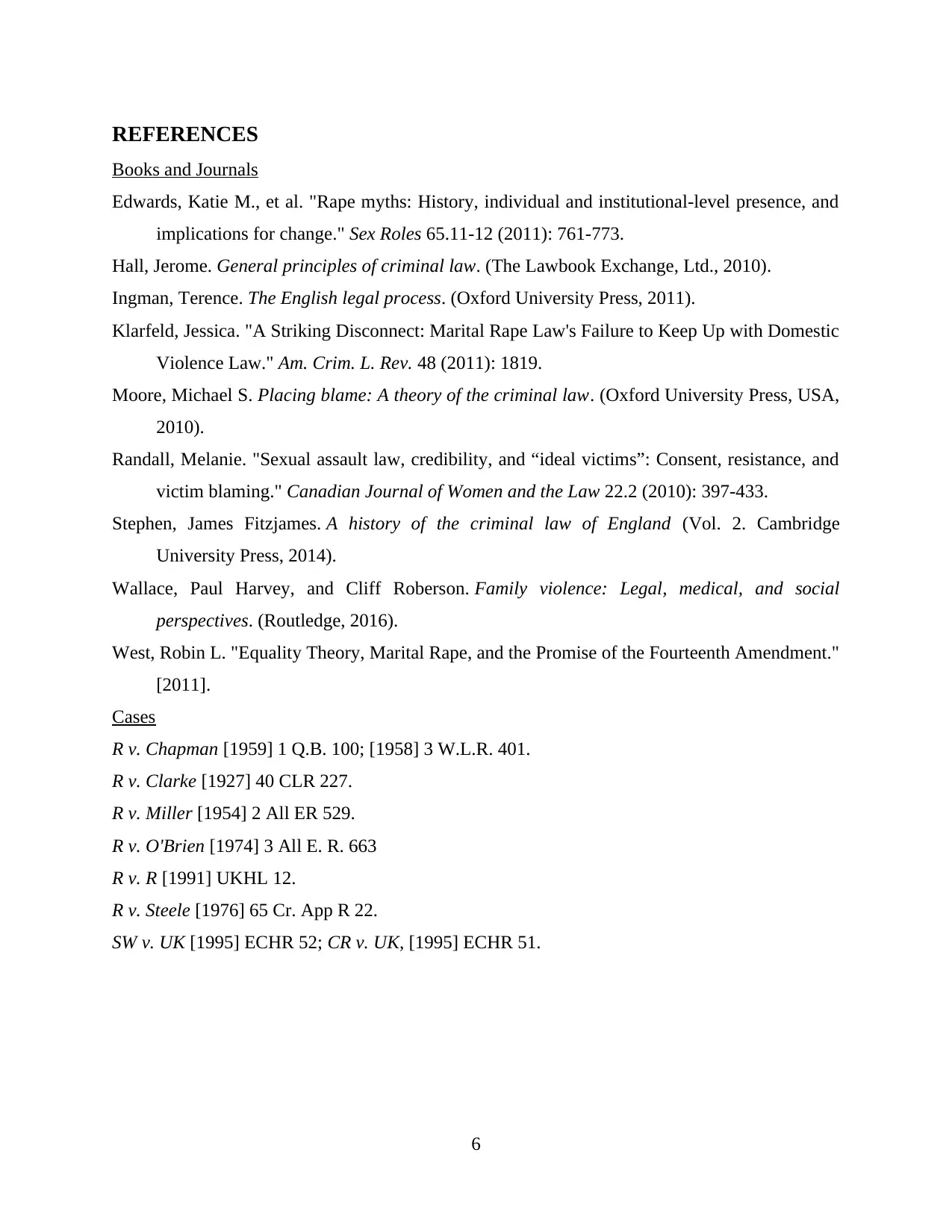
REFERENCES
Books and Journals
Edwards, Katie M., et al. "Rape myths: History, individual and institutional-level presence, and
implications for change." Sex Roles 65.11-12 (2011): 761-773.
Hall, Jerome. General principles of criminal law. (The Lawbook Exchange, Ltd., 2010).
Ingman, Terence. The English legal process. (Oxford University Press, 2011).
Klarfeld, Jessica. "A Striking Disconnect: Marital Rape Law's Failure to Keep Up with Domestic
Violence Law." Am. Crim. L. Rev. 48 (2011): 1819.
Moore, Michael S. Placing blame: A theory of the criminal law. (Oxford University Press, USA,
2010).
Randall, Melanie. "Sexual assault law, credibility, and “ideal victims”: Consent, resistance, and
victim blaming." Canadian Journal of Women and the Law 22.2 (2010): 397-433.
Stephen, James Fitzjames. A history of the criminal law of England (Vol. 2. Cambridge
University Press, 2014).
Wallace, Paul Harvey, and Cliff Roberson. Family violence: Legal, medical, and social
perspectives. (Routledge, 2016).
West, Robin L. "Equality Theory, Marital Rape, and the Promise of the Fourteenth Amendment."
[2011].
Cases
R v. Chapman [1959] 1 Q.B. 100; [1958] 3 W.L.R. 401.
R v. Clarke [1927] 40 CLR 227.
R v. Miller [1954] 2 All ER 529.
R v. O'Brien [1974] 3 All E. R. 663
R v. R [1991] UKHL 12.
R v. Steele [1976] 65 Cr. App R 22.
SW v. UK [1995] ECHR 52; CR v. UK, [1995] ECHR 51.
6
Books and Journals
Edwards, Katie M., et al. "Rape myths: History, individual and institutional-level presence, and
implications for change." Sex Roles 65.11-12 (2011): 761-773.
Hall, Jerome. General principles of criminal law. (The Lawbook Exchange, Ltd., 2010).
Ingman, Terence. The English legal process. (Oxford University Press, 2011).
Klarfeld, Jessica. "A Striking Disconnect: Marital Rape Law's Failure to Keep Up with Domestic
Violence Law." Am. Crim. L. Rev. 48 (2011): 1819.
Moore, Michael S. Placing blame: A theory of the criminal law. (Oxford University Press, USA,
2010).
Randall, Melanie. "Sexual assault law, credibility, and “ideal victims”: Consent, resistance, and
victim blaming." Canadian Journal of Women and the Law 22.2 (2010): 397-433.
Stephen, James Fitzjames. A history of the criminal law of England (Vol. 2. Cambridge
University Press, 2014).
Wallace, Paul Harvey, and Cliff Roberson. Family violence: Legal, medical, and social
perspectives. (Routledge, 2016).
West, Robin L. "Equality Theory, Marital Rape, and the Promise of the Fourteenth Amendment."
[2011].
Cases
R v. Chapman [1959] 1 Q.B. 100; [1958] 3 W.L.R. 401.
R v. Clarke [1927] 40 CLR 227.
R v. Miller [1954] 2 All ER 529.
R v. O'Brien [1974] 3 All E. R. 663
R v. R [1991] UKHL 12.
R v. Steele [1976] 65 Cr. App R 22.
SW v. UK [1995] ECHR 52; CR v. UK, [1995] ECHR 51.
6
1 out of 8
Related Documents
Your All-in-One AI-Powered Toolkit for Academic Success.
+13062052269
info@desklib.com
Available 24*7 on WhatsApp / Email
![[object Object]](/_next/static/media/star-bottom.7253800d.svg)
Unlock your academic potential
Copyright © 2020–2026 A2Z Services. All Rights Reserved. Developed and managed by ZUCOL.
![Detailed Case Study of R v R [1992] AC 599: Examining Legal Issues](/_next/image/?url=https%3A%2F%2Fdesklib.com%2Fmedia%2Fimages%2Fan%2F3fcd22026cb547d2ada436020ea22f5d.jpg&w=256&q=75)




